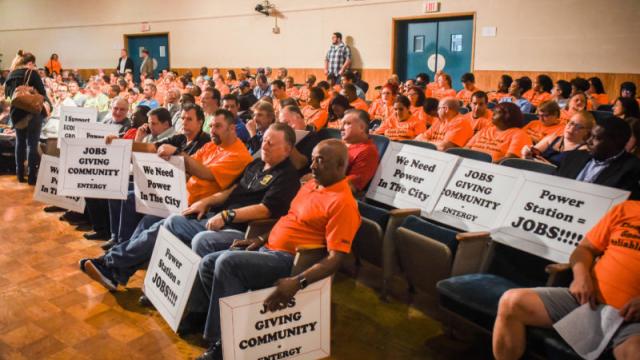
Astroturfing, according to Merriam Webster, is “organized activity that is intended to create a false impression of a widespread, spontaneously arising, grassroots movement in support of or in opposition to something (such as a political policy) but that is in reality initiated and controlled by a concealed group or organization (such as a corporation).”
In what may be a first-of-its-kind protest – and a textbook example of astroturfing – a sub-contractor of a local utility in New Orleans has paid people to act as residential supporters of a proposed $200 million gas-fired power plant. The organized, enthusiastic "protesters" helped lead to the plant's approval before the ploy was recently exposed.
The New Orleans City Council approved the construction of a new plant for the utility company Entergy New Orleans in March by a vote of 6-1. The lone dissenting vote came from Councilmember Susan Guidry who, after the practice of astroturfing was brought to light, called it, “morally reprehensible.” However, this form of staged advocacy in and of itself is not illegal.
Congress has passed numerous laws requiring disclosure of sources of lobbying and the sources of the money that support lobbying. The attempt to bring this type of information to light was weakened by the Supreme Court’s 2010 decision in Citizen’s United. Disclosure is still required for electioneering communications, but corporations and individuals can instead funnel money through non-profits. As a result, corporations are more likely to face penalties from the federal government for astroturfing via fake online reviews. Since 2010, the Federal Trade Commission has fined several companies for this practice.
The term astroturfing was first used in 1985 by Senator Lloyd Benson of Texas. In response to a deluge of letters he received that supported a position favorable to an insurance company, Benson stated, “A fellow from Texas can tell the difference between grass roots and Astroturf... [T]his is generated mail.”
However, one person’s grassroots movement is another’s astroturf, because sometimes it becomes tricky to define whether protests are actually astroturf or not. For example, the Tea Party, which emerged in 2009, was made up of millions of supporters. That would qualify it as grassroots. It is also true, however, that the Tea Party movement was funded by billionaires like the deregulation-loving Koch Brothers. Likewise, billionaire Michael Bloomberg spent $50 million to assist grassroots voters in instituting more gun control legislation at the local and state levels.
Some movements are clearly not grassroots-organized but use deceptive practices to conceal this fact. In 2005, the organization Save Our Species Alliance lobbied Congress to weaken the 1973 Endangered Species Act. The director of SOSA had previously been director of communications for Georgia-Pacific, a subsidiary of Koch Industries.
In the social media age, it is possible to create fake grassroots organizations that appear to be genuine, as Russian operatives did via Facebook in 2016 to disrupt and help sway the U.S. presidential elections. The CIA has warned that Russian operatives will attempt to interfere again in the 2018 midterms.
“We expect Russia to continue using propaganda, social media, false flag personas, sympathetic spokesmen, and other means of influence to try to build on its wide range of operations and exacerbate social and political fissures in the United States,” former CIA Director Mike Pompeo told Congress in February.
Returning to Louisiana, when the New Orleans City Council held hearings last October on a proposed new power plant for the local utility carrier Entergy New Orleans, supporters of the proposed plant show up in orange shirts that read: “Clean Energy. Good jobs. Reliable Power.” One attendee spoke publicly in favor of the plant.
However, at least some of the attendees in support were actually paid actors, something they didn’t disclose and which was unknown until “The Lens” piece appeared last month. Entergy New Orleans acknowledged a public relations firm working on its behalf paid actors to attend in support, but denied being aware of it.
A new power plant may benefit the utility's bottom line, although opponents contend the gas plant isn't necessary because it will rarely be used and there are more efficient and less polluting ways to generate electricity for the city. On May 21, the New Orleans City Council ordered an investigation into Entergy’s role in getting paid actors to appear in support of the new plant.
The city council has not reversed its earlier decision to approve construction of the plant, but will consider doing so after the investigation is concluded. “Everything is on the table,” Council President Jason Williams said.











